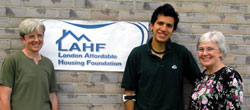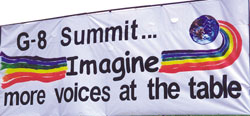Engaging transformation
The Sisters of St. Joseph of London stand with people on the margins to better understand and address the structures of exclusion.
By Sr. Sue Wilson, csj
September 2006
Return to Table of Contents
Print Article
In the spring of 2006, the United Nations Committee on Economic, Social and Cultural Rights issued a report assessing Canada's commitment to rights that help to create social inclusion. These rights include adequate income, food security, affordable housing, quality education and child care, employment insurance and access to clean water, to name a few.

Sr. Sue Wilson, Jorge Torres and Sr. Joan Atkinson at one of the new townhomes built by the London Affordable Housing foundation. Jorge lives at the new townhome complex.
The report noted several positive aspects including Canada's ranking at the top of the Human Development Index of the United Nations Development Programme and our capacity to achieve a high level of all of the Covenant rights. At the same time, there was a long list of concerns that illustrated a lack of will in Canada to ensure that all people have access to these rights.
The Sisters of St. Joseph of London examine such reports through the particular lens that we have identified as our congregational focus: an ever-deepening integration of our contemplative spirituality with our work for systemic justice. It gives us a vision of our deep connections with each other and with the earth. This has many implications for the work we do and the way we do it.
"The political passion of the bible calls us to a politically engaged spirituality."
Marcus Borg, "The Heart of Christianity"
First, we are committed to standing with all who experience barriers to eco-social and economic inclusion. We do this in order to understand how the systems in which we live are creating these barriers. This draws a number of our members into direct involvement with many different constituencies and justice issues. For example, some of us visit at our hospitality centre downtown where issues of food and income security are raised, and others work with refugees to address immigration issues; some join with people who need affordable housing, while others live and learn in indigenous communities.
When we examine eco-social, economic and political systems from the perspective of those who experience exclusion within these systems, then we can more readily see the unjust structures within a system.
To increase the effectiveness of our efforts to create change, we partner with other groups engaged in these activities, groups that have come to similar conclusions as to which structures are creating barriers of exclusion.
Working with others

Sisters of St. Joseph and friends working on the G8 summit sign.
Two of the many different networks with which we work are Campaign 2000 and the Make Poverty History campaign. Through our partnership with Campaign 2000, we can work with others to address the eco-social, economic and political structures and policies that are key factors in creating barriers of exclusion in Canada. For example, when the 2005 Report Card on Child Poverty in Ontario was released by Campaign 2000, it gave us an opportunity to call London's television news and local newspaper to do stories on child poverty in London.
These stories helped to create an awareness of the deep poverty in which some Londoners live. With the statistics and trends from Campaign 2000 in hand, we talked to reporters about the inadequate levels of minimum wage and social assistance in Ontario. We also identified possible solutions. We pointed to our involvement in the London Affordable Housing Foundation and explained how, in working with our partners to create affordable housing in London, we had experienced the inadequacies of current government policies on affordable housing.
Likewise when we meet with politicians at the municipal, provincial and federal levels, we use Campaign 2000's policy analysis. Campaign 2000 serves as one of our sources for suggesting policy changes, especially on policies connected with the need for universal, quality child care – a critical vehicle for addressing the economic, social and cultural rights of families who live in poverty.

A sign for the G8 summit that was on the front lawn of Mount St. Joseph, motherhouse of the sisters of St. Joseph in London.
At the same time, we are keenly aware that the economic, social and cultural rights identified by the U.N. charter are meant for all people in the world. Our efforts to engage in the Make Poverty History campaign are one particular means of acknowledging our commitment to work toward greater equity on a global scale as well. We were involved in the White Band campaign to call attention to the four main goals of Make Poverty History, and several members helped to spread word of the campaign by speaking to various faith communities. In addition, we meet with MPs and write letters advocating for policies that would support the goals of Make Poverty History and counter the growing gap between rich and poor in the world. Similarly, we frequently encourage our government representatives to be a voice for reform at meetings involving the G8 countries, the World Trade Organization, the World Bank and the International Monetary Fund. Like the efforts to address poverty in Canada, these are all ways of pointing to our deep connections with each other and with the earth.
Finally, in keeping with our focus on integrating our contemplative spirituality with our work for systemic justice, we talk to various faith constituencies about the ways in which both contemplation and justice work engage us at the level of transforming consciousness. This includes examining and exploring the attitudes and assumptions that shape our relationships – whether personal, social, cultural, ecological, political or economic. It means that a systemic justice approach is as much about our own ongoing transformation as it is about working toward transformation in society.
Sr. Sue Wilson coordinates the Systemic Justice Office of the Sisters of St. Joseph of London, Ontario, with Sr. Joan Atkinson.
Return to Table of Contents
Print Article